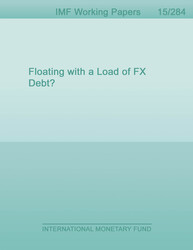
Floating with a Load of FX Debt?
Countries with de jure floating exchange rate regimes are often reluctant to allow their currencies to float freely in practice. One reason why countries may wish to limit exchange rate volatility is potential negative balance sheet effects due to currency mismatches on the balance sheets of firms and households. In this paper, we show in a sample of 15 emerging market economies that countries with large foreign exchange (FX) debt in the non-financial private sector tend to react more strongly to exchange rate changes using both FX interventions and monetary policy. Thus, our results support the idea that an important source of "fear of floating" is balance sheet currency mismatches. This effect is asymmetric; that is, countries stem depreciation but not appreciation pressure. Moreover, FX debt financed through the domestic banking system is more important for fear of floating than FX debt obtained directly from external sources.
Publication date: December 2015
ISBN: 9781513543307
$18.00
Add to Cart by clicking price of the language and format you'd like to purchase
Available Languages and Formats
| English |
Prices in red indicate formats that are not yet available but are forthcoming.
Topics covered in this book
This title contains information about the following subjects.
Click on a subject if you would like to see other titles with the same subjects.
Economics- Macroeconomics , Economics / General , International - Economics , FX interventions , Monetary policy , Balance sheet effects , Exchange rates , Emerging markets
Summary
Copyright © 2010 - 2024
Powered by:
AIDC



